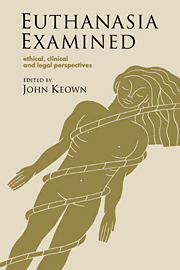Book contents
- Frontmatter
- Contents
- List of contributors
- Acknowledgements
- Foreword by Daniel Callahan
- Introduction
- 1 Euthanasia and the value of life
- 2 A philosophical case against euthanasia
- 3 The philosophical case against the philosophical case against euthanasia
- 4 The fragile case for euthanasia: a reply to John Harris
- 5 Final thoughts on final acts
- 6 Misunderstanding the case against euthanasia: response to Harris's first reply
- 7 Euthanasia: back to the future
- 8 The case for legalising voluntary euthanasia
- 9 Extracts from the Report of the House of Lords Select Committee on Medical Ethics
- 10 Walton, Davies, Boyd and the legalization of euthanasia
- 11 Where there is hope, there is life: a view from the hospice
- 12 Letting vegetative patients die
- 13 A case for sometimes tube-feeding patients in persistent vegetative state
- 14 Dilemmas at life's end: a comparative legal perspective
- 15 Physician-assisted suicide: the last bridge to active voluntary euthanasia
- 16 Euthanasia in the Netherlands: sliding down the slippery slope?
- 17 Advance directives: a legal and ethical analysis
- 18 Theological aspects of euthanasia
- Index
6 - Misunderstanding the case against euthanasia: response to Harris's first reply
Published online by Cambridge University Press: 03 May 2010
- Frontmatter
- Contents
- List of contributors
- Acknowledgements
- Foreword by Daniel Callahan
- Introduction
- 1 Euthanasia and the value of life
- 2 A philosophical case against euthanasia
- 3 The philosophical case against the philosophical case against euthanasia
- 4 The fragile case for euthanasia: a reply to John Harris
- 5 Final thoughts on final acts
- 6 Misunderstanding the case against euthanasia: response to Harris's first reply
- 7 Euthanasia: back to the future
- 8 The case for legalising voluntary euthanasia
- 9 Extracts from the Report of the House of Lords Select Committee on Medical Ethics
- 10 Walton, Davies, Boyd and the legalization of euthanasia
- 11 Where there is hope, there is life: a view from the hospice
- 12 Letting vegetative patients die
- 13 A case for sometimes tube-feeding patients in persistent vegetative state
- 14 Dilemmas at life's end: a comparative legal perspective
- 15 Physician-assisted suicide: the last bridge to active voluntary euthanasia
- 16 Euthanasia in the Netherlands: sliding down the slippery slope?
- 17 Advance directives: a legal and ethical analysis
- 18 Theological aspects of euthanasia
- Index
Summary
John harris's second essay (Chapter 3) depends upon some striking misunderstandings of the positions central to my ‘A philosophical case against euthanasia’ (Chapter 2). These misunderstandings or misstatements are of more than local or personal interest. They are characteristic of euthanasiast attempts to rationalise the sentiments which are the movement's real guide.
Chapter 3 is notable also for its open reliance upon the thought that there are persons who simply ‘should die’. To the notion that there are people who lack the status of ‘persons’, the thought that some innocent people who concededly do have that status nevertheless should die, and so should be killed, adds something equally sinister.
I have not, of course, seen Harris's third essay (Chapter 5). But at the end of the debate readers will, I think, wish to ask: Has Harris offered any clear and settled reason for doubting that all living human beings are people (persons), however disabled? Or for doubting that intention matters to the content of our fundamental rights, and duties of respect? Or that allowing sentiment to preside in these matters will propel us down a slippery slope into fearful oppression of the aged and infirm?
- Type
- Chapter
- Information
- Euthanasia ExaminedEthical, Clinical and Legal Perspectives, pp. 62 - 71Publisher: Cambridge University PressPrint publication year: 1995
- 1
- Cited by



